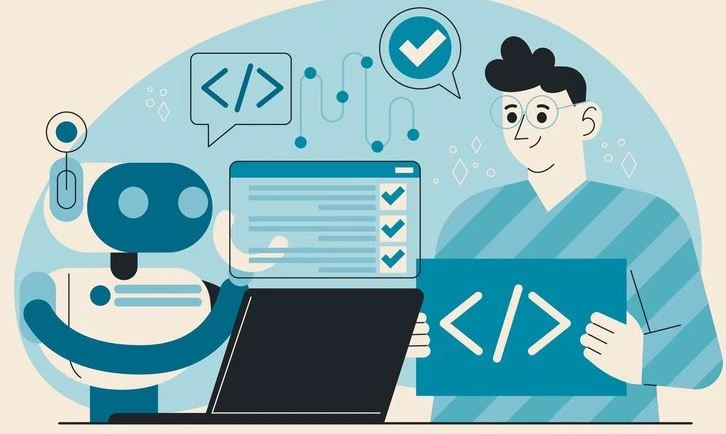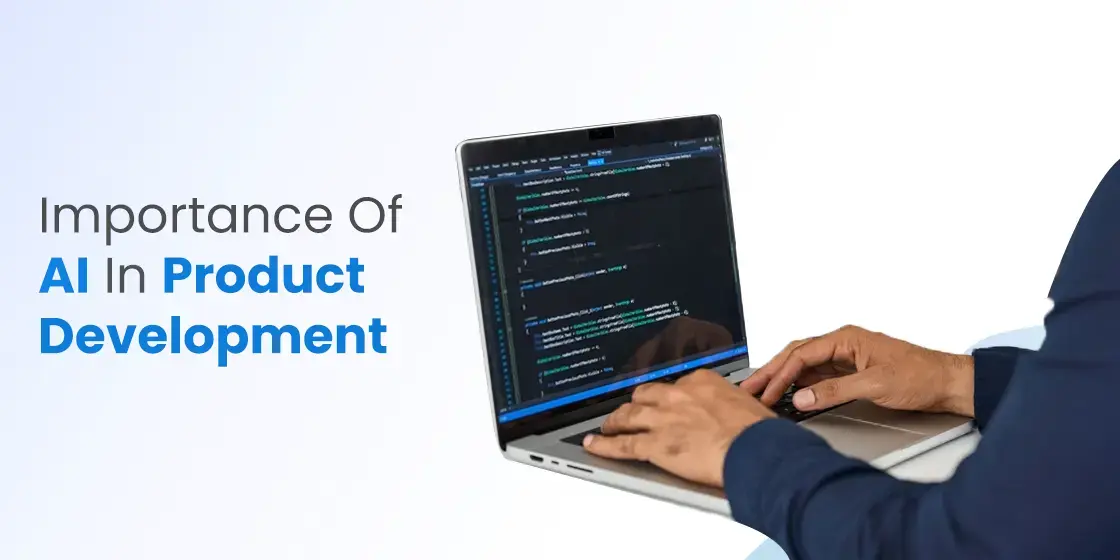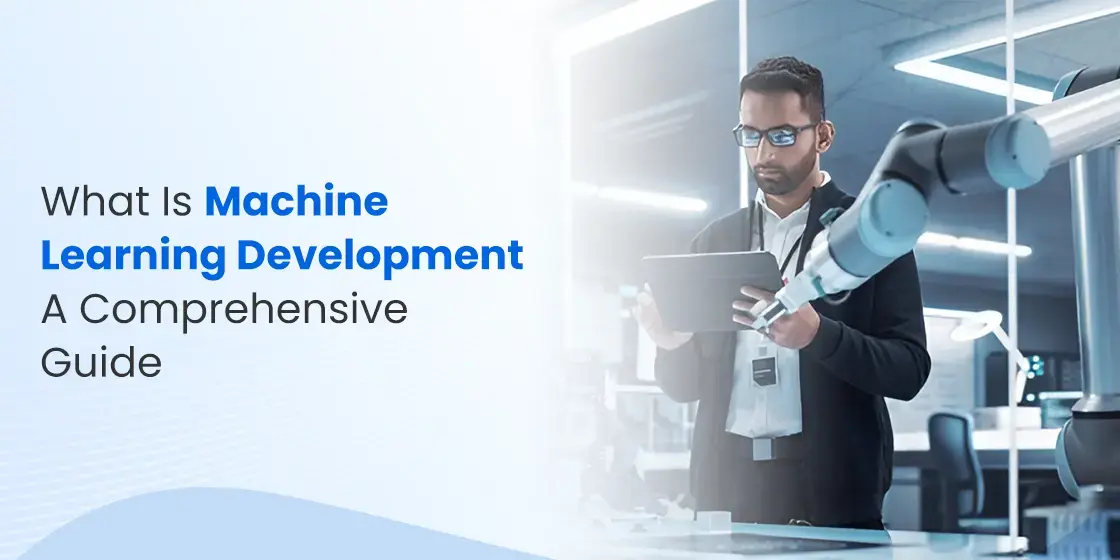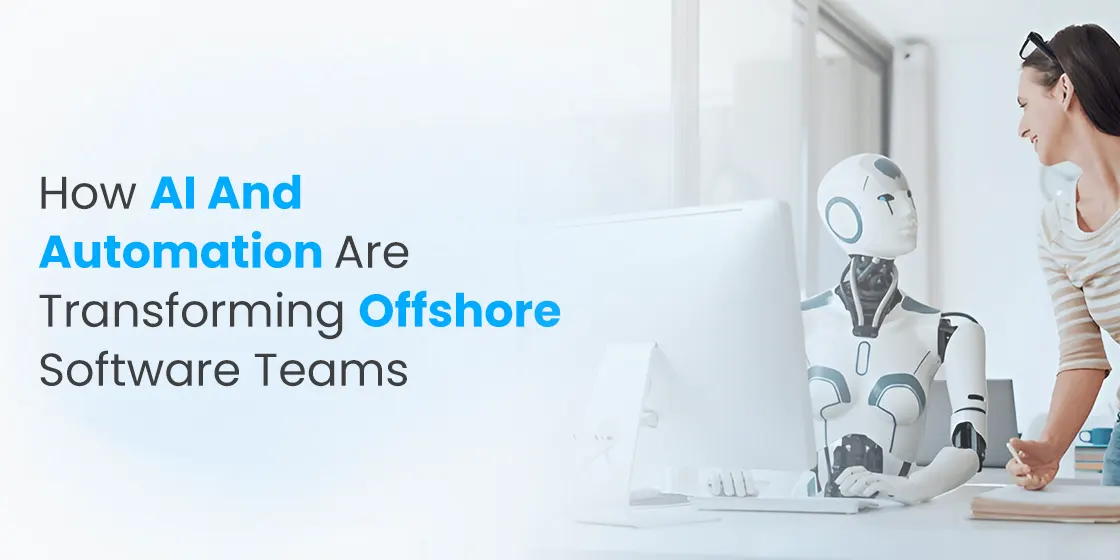Table of Content
Know About the Importance and Benefits of AI in Product Development
Developing a business application requires complete planning, as well as availability of technical resources. It is one of those jobs that is usually carried out by expert professionals having tons of market experience. It also requires a decent amount of time, because everything is programmed and compiled manually. However, with the emergence of AI, this whole process is now becoming a bit streamlined. Developers are increasingly exploring the opportunities of AI in product development, so that the time to build and deploy applications can become faster.
During the last few years, AI has brought a great revolution in the tech world. It has introduced a concept of automation, allowing businesses to streamline different types of tasks effortlessly. Bringing automation in product development is one of those advantages that makes AI a revolutionary thing for the tech world. By adopting AI, companies are now looking to provide software development services with better adeptness. They understand the importance of automation, and how AI can help them to achieve it without compromising the quality of the development process.
If you do not know how AI simplifies product development, read this blog in detail. It will let you know the utility of AI in product development, as how it should be used to build powerful applications effortlessly. Let’s start from the basics understanding why AI is quickly becoming the to-go technology in the tech world. This will let you know its importance in different fields, especially in software development.
Why AI is Becoming Popular in the Tech World?

AI is becoming increasingly popular in the tech world due to its ability to drive innovation and efficiency across various industries. AI technologies, such as machine learning and natural language processing, enable companies to automate complex tasks, analyze vast amounts of data, and make predictions that were previously impossible. This capability allows businesses to optimize operations, enhance decision-making, and reduce costs. For example, AI-driven algorithms can streamline supply chains, personalize customer experiences, and detect fraud more effectively than traditional methods.
Moreover, the rapid advancement in computational power and the availability of large datasets have accelerated AI’s adoption. With the proliferation of cloud computing and big data, companies now have the infrastructure to develop and deploy AI models at scale. These advancements have democratized access to AI tools, enabling even smaller businesses to harness its power. As a result, AI is no longer confined to tech giants but is being integrated across a wide range of sectors, including healthcare, finance, manufacturing, and retail.
Finally, AI’s potential to create new products and services is a major driver of its popularity. Innovations such as self-driving cars, virtual assistants, and smart home devices are all powered by AI, offering consumers more convenience and enhancing their daily lives. The growing interest in AI is also fueled by the promise of future advancements, such as AI-driven drug discovery or personalized medicine. As AI continues to evolve, it is poised to become an integral part of the technology landscape, shaping the future of various industries and redefining how we interact with technology.
Understanding AI in Product Development

AI has become a crucial asset in the modern-era product software development, fundamentally altering the processes by which companies generate ideas, design, and launch new products. In the early stages of product development, which focus on ideation and conceptualization, AI plays a vital role by enhancing the ability to conduct in-depth market analysis and predict trends. Through advanced data analytics, AI can sift through large volumes of information, identifying emerging patterns and behaviors that might not be immediately apparent through traditional methods.
The strength of AI lies in its ability to analyze vast datasets drawn from diverse sources, such as social media platforms, customer feedback, and industry reports. By processing this information, AI can uncover market gaps that present opportunities for new products or improvements on existing ones. It also offers insights into consumer preferences, helping businesses understand what features or qualities are most valued by their target audience. These insights are invaluable for companies looking to stay ahead of the curve, as they provide a data-driven foundation for product innovation.
Furthermore, AI’s ability to predict consumer behavior and market trends allows companies to tailor their products more precisely to meet customer needs. By leveraging AI-driven insights, businesses can optimize product design, functionality, and even marketing strategies to resonate more effectively with their audience. This not only increases the likelihood of a product’s success in the market but also shortens the time-to-market by streamlining the development process. As a result, AI is not just a tool for innovation but a strategic advantage in the highly competitive landscape of modern product development.
How AI Simplifies Product Development?

AI is a revolutionary technology that provides assistance to software developers in different stages of product development. If you do not know how AI streamlines the whole product development process, take a look at the points defined below.
Research and Analysis
Artificial intelligence (AI) technology serves as a powerful catalyst for innovation, reshaping the way businesses conceive and develop new products. In the past, entrepreneurs often relied heavily on intuition, personal experience, and general market trends to guide their decisions. While these methods have their merits, they are inherently limited by human biases and the unpredictability of changing market dynamics. AI, however, introduces a new paradigm by analyzing vast amounts of data to uncover patterns and insights that might otherwise go unnoticed.
By harnessing the analytical power of AI, founders are better equipped to move beyond the uncertainty and guesswork that traditionally accompanies product development excellence. Instead of simply following what has worked in the past or what competitors are doing, entrepreneurs can now rely on AI-generated insights to identify and address genuine customer needs. This shift from a reactive to a proactive approach in product development means that businesses can create offerings that are not just incrementally better but fundamentally different from what is currently available.
Ultimately, the integration of AI into the idea generation and development process empowers founders to bring groundbreaking products to market. This data-driven approach means that products are designed with a clear understanding of customer pain points and preferences. The result is not just incremental improvements but potentially revolutionary products that can disrupt entire industries. As AI continues to evolve, it will likely play an even more critical role in enabling entrepreneurs to push the boundaries of innovation and bring truly transformative ideas to life.
Design and Prototyping
Leveraging existing product data and analyzing customer feedback, generative AI systems significantly enhance the design process by offering rapid improvements and generating multiple design variations in a matter of seconds. These AI-driven systems analyze vast amounts of data to understand trends, preferences, and pain points, enabling them to create designs that are aligned with user needs. This capability transforms the traditional design and product management process, which often involves time-consuming iterations and limited exploration of concepts.
By streamlining the process, generative AI allows development teams to quickly iterate on numerous design options, broadening the scope of possibilities that can be considered. This expanded range of options enables teams to identify the most user-friendly and effective designs, ultimately leading to products that better meet customer expectations and drive higher levels of satisfaction. The speed and precision of these AI systems ensure that the development process is both efficient and thorough, giving teams the tools they need to create products that resonate with users on a deeper level.
Cost Reduction
When AI systems automate repetitive tasks, product development teams gain the freedom to focus on more strategic and creative aspects of the product. Instead of spending valuable time on routine activities, such as data entry, basic analysis, or repetitive design tasks, team members can direct their attention to refining product vision, enhancing user experience, and making critical decisions that drive innovation. This shift not only boosts productivity but also fosters a more engaging and intellectually stimulating work environment, where talent and expertise are utilized to their fullest potential.
In addition to streamlining tasks, AI plays a crucial role in optimizing resource allocation and minimizing waste throughout the development process. By analyzing data and identifying patterns, AI systems can ensure that resources such as time, materials, and human capital are used most effectively. This optimization reduces the likelihood of overproduction, unnecessary expenditure, or misallocation of resources, all of which contribute to a more sustainable and cost-effective development cycle. AI-driven insights allow teams to anticipate needs and allocate resources with greater precision.
Another significant advantage of AI in product development is its ability to conduct predictive testing, which leads to early error detection and prevents costly rework and delays. By simulating various scenarios and stress-testing designs, AI can identify potential flaws or issues before they escalate into major problems. This proactive approach not only saves time and reduces costs but also accelerates the overall development timeline, enabling companies to introduce products to the market faster and at a lower cost.
Improved Product Quality
AI technologies play a pivotal role in enhancing product quality by providing advanced capabilities for simulations, testing, and validation. AI-powered tools allow development teams to create virtual models of products and simulate a wide range of real-world scenarios, from stress tests to user interactions. These simulations enable the early identification of potential design flaws or performance issues that might otherwise go unnoticed until later stages of development. By addressing these issues upfront, teams can refine their designs and make necessary adjustments before committing to the production.
Moreover, the ability of AI to optimize product performance during the design phase leads to substantial savings in both time and costs. Traditional product development often involves multiple iterations of prototypes, each one requiring time and resources to produce, test, and refine. AI, however, streamlines this process by enabling thorough testing and validation in a virtual environment, minimizing the need for numerous physical prototypes. This efficiency ensures that the final product is not only more refined but also better aligned with customer expectations.
Predictive Analytics
Incorporating AI into product development offers the remarkable ability to predict user behavior and anticipate how people will interact with a product long before it is physically created. By analyzing vast amounts of user data and behavioral patterns, AI can generate detailed insights into the ways users are likely to engage with various features and interfaces. This predictive capability is invaluable for designers as it provides a clear understanding of potential user preferences and pain points.
One of the key advantages of AI in this context is its ability to create virtual simulations that mimic real-world user interactions. These simulations allow development teams to explore how different user segments might navigate the product, revealing potential usability issues that could impede the user experience. By identifying these problems early in the design phase, teams can make targeted adjustments to improve the overall functionality and accessibility of the product.
Furthermore, AI’s adaptive capabilities enable it to tailor these simulations to specific audience needs, making the testing process even more precise and relevant. For example, AI can adjust simulations based on demographic data, usage patterns, or specific functional requirements, providing insights into how different groups might interact with the product. This level of customization ensures that the product is designed with a diverse user base in mind, ultimately leading to a more inclusive and user-centric product.
Future of AI in Product Development

The future of AI in product development is poised to unlock vast potential, significantly enhancing innovation, and deeper focus on customer needs. As AI technology continues to evolve, it will usher in a new era of product development, where processes are not only faster and more streamlined but also more attuned to the ever-changing demands of consumers. The growing sophistication of AI applications will transform how products are brought to market, enabling companies to stay ahead of the curve and deliver solutions that truly resonate with users.
With ongoing advancements in machine learning, natural language processing, computer vision, and robotics, AI is set to revolutionize the product development landscape. Machine learning will allow AI systems to analyze increasingly complex data sets, uncovering patterns and trends that were previously difficult to detect. This capability will empower development teams with deeper insights into customer preferences, market dynamics, and potential product performance, leading to more informed decision-making and innovative design solutions.
Additionally, advancements in computer vision and robotics will enable AI to automate a wider range of tasks with unparalleled accuracy and speed. These technologies will allow AI to not only perform repetitive tasks but also take on more complex, labor-intensive processes, such as quality control, prototyping, and even aspects of the manufacturing process. By automating these functions, AI will free up human resources to focus on higher-level strategic activities, driving greater efficiency across the product development lifecycle.
Frequently Asked Questions
| How AI has revolutionized the tech world? AI has revolutionized the tech world by automating complex tasks, enhancing decision-making through data-driven insights, and enabling the creation of smarter, more personalized technologies. This has accelerated innovation and transformed industries across the board. |
| How AI can be used in product development? AI can be used in product development to optimize design processes by predicting user behavior. It helps to automate repetitive tasks, and generate data-driven insights, leading to faster innovation and improved product quality. |
| What are the benefits of AI in product development? AI benefits product development by accelerating design iterations through predictive simulations and automating routine tasks. It provides better accuracy in execution, allowing developers to handle multiple tasks simultaneously. |
Final Words
That concludes our entire article in which we have discussed the utility of AI in product development. It is certainly a great technology that has revolutionized different fields with unique automation features. In software development, AI has also done wonders in terms of introducing automation for different critical processes. With the help of AI, developers have now got the leverage to handle multiple tasks simultaneously. This not only allows them to save time, but also pay attention to other tasks that require more focus right from the start.
Empower your digital initiatives with BariTechSol, a premier custom software development company. Our skilled team tailors cutting-edge solutions to your unique needs. Elevate your tech experience and stay ahead in the digital realm. Partner with BaritechSol and code the success of your next big idea.


